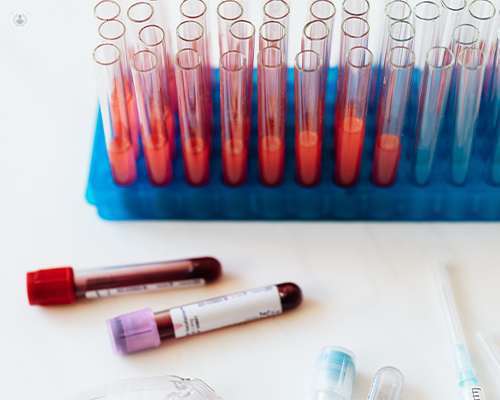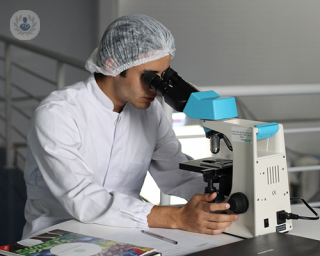PSA test
What is a PSA test?
The PSA test is a blood test that measures the amount of prostate-specific antigen (PSA) in the blood. This is a protein produced by normal and abnormal cells in the prostate, but too much PSA may suggest problems with the prostate.

Why is it done?
The PSA test is done to assess a man's risk of prostate cancer. Early detection of prostate cancer can be important in getting appropriate treatment in time. A normal PSA result can provide reassurance of a lower risk of prostate cancer.
If you have already been diagnosed with prostate cancer, the procedure can be used to test how effective the treatment is and check for any recurring cancer.
What does it involve?
The PSA test can be done at your GP surgery. It involves a simple blood test, usually drawn from the arm, that is then sent to a laboratory to be tested.
Who should have the test done?
If you’re over the age of 50, or 45 and over with a family history of prostate cancer, or you are in a high-risk group, you should talk to you GP about testing your PSA levels.
How can I prepare for it?
Before having the PSA test, your GP will talk about the advantages and disadvantages of the test and talk about your risk of having prostate problems or cancer. They may also carry out a physical exam of the prostate, look at your medical history, and any previous prostate biopsy results. Sometimes, your GP will perform a urine test to rule out any urinary infection.
If you have another serious health condition, or have a life expectancy of less than 10 years, your doctor may recommend not to go ahead with the test.
You may be asked to avoid rigorous exercise and ejaculation for 48 hours before the test, as this can raise PSA levels in the blood. It may be advised to avoid anal sex and any form of prostate stimulation or examination for a week before the test, as this too can raise the levels of PSA in the blood.
What does the procedure feel like?
The PSA test is just a simple blood test. However, the doctor will physically examine your prostate and may perform a urinary test if they believe an infection might be present.
A physical examination involves having your GP gently insert a lubricated finger into the rectum to feel the prostate. It is usually a quick process and may be uncomfortable, but not painful.

How accurate is a PSA test?
According to the NHS, three out of four men with raised PSA levels will not have cancer. Additionally, it may miss approximately 15 per cent of prostate cancer. Many men with raised PSA levels don’t have prostate cancer and some men who have prostate cancer have normal PSA levels.
A PSA test alone won’t diagnose prostate cancer. A digital rectal exam, whether or not you’re at high risk of cancer, and any previous test results will all need to be taken into consideration.
Other forms of the test may be done to improve result readings. These may include:
- Change in PSA levels over time (PSA velocity). A rapid rise in levels may signal aggressive cancer.
- Percentage of free PSA (PSA not attached to other cells in the blood). The more PSA that is attached to cells can increase the chance of having cancer.
- PSA per volume of tissue (PSA density). A higher density can be caused by cancer. An MRI or transrectal ultrasound are usually used to measure PSA density.
What would a bad result mean?
A raised PSA level in the blood can be a sign of a problem with the prostate gland. It could signal:
- an enlarged prostate
- prostatitis (an inflamed or infected prostate)
- problems emptying your bladder
- prostate cancer
Other factors that can cause PSA levels to rise include:
- a urine infection
- intensive exercise
- ejaculation 48 hours before the test
- anal sex 48 hours before the test
- prostate biopsy: it should be avoided for up to 6 weeks before the test
- certain medications
If your PSA levels are high, your doctor may refer you to a specialist urologist; or if there are obvious reasons for high levels of PSA, they may simply suggest that you repeat the test in the future to see if the level changes.
What are the possible side effects and complications of a PSA test?
Side effects and complications that may occur from the procedure include:
- bruising at the site of the blood test
- anxiety and stress from false-positive results
- false reassurance and failure to diagnose prostate cancer from a false-negative test
A false-positive result may lead to other medical procedures being done, which may have their own side effects. If a biopsy is taken, there may be bleeding, infection, and/or pain.
Diagnosis of low-risk prostate cancer, that is unlikely to make you unwell or require treatment, will need to be monitored.

















